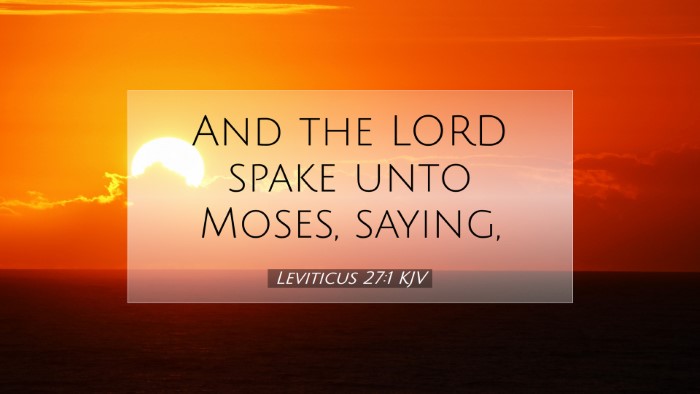Commentary on Leviticus 27:1
Verse Reference: Leviticus 27:1
Text: "And the Lord spake unto Moses, saying,"
Introduction
The concluding chapters of the Book of Leviticus serve to solidify the principles of holiness and consecration that are foundational to Israel’s relationship with Yahweh. Leviticus 27 introduces us to specific instructions regarding vows and the dedicated value of individuals and animals to the Lord. This verse sets the stage for understanding God's communication with Moses concerning the nature of commitment His people must adhere to.
The Divine Communication
This opening verse highlights an important theological aspect: divine revelation. The phrase "And the Lord spake unto Moses" reflects God’s desire to instruct His people through a mediated voice. Matthew Henry notes that God communicates with His chosen leaders to ensure His will is made known among the people. This interaction establishes Moses as an essential figure in conveying divine mandates.
God's Authority Illustrated
The direct communication from God underscores His authority as the sovereign deity. Albert Barnes emphasizes that such direct speech affirms God’s sovereignty over the covenant community. He elaborates that every command following this verse originates from the will of God, thus demanding obedience from the people.
Contextual Significance
Leviticus, as a book of law and instruction, speaks to the Israelites in the wilderness, emphasizing their unique identity as God’s chosen people. The laws regarding valuations in Chapter 27 serve to remedy the human fear of inadequacy in fulfilling commitments to God. Adam Clarke explores the socio-economic implications of these laws, showing that they were designed not only to express devotion but also provided practical guidance concerning vows.
The Nature of Vows
Vows in the Israelite context were serious commitments made to God. Obligations were often fulfilled through offerings or other sacrificial means. Clarke expresses that such vows are sacred and worthy of careful consideration, reaffirming the gravity of spoken promises to God. The focus on valuation speaks not only to economic considerations but also to the spiritual weight of the commitments made.
Application for Today
The verse and its surrounding context offer profound insights into the nature of our commitments to God today. Pastors and leaders can draw lessons on the importance of integrity in our vows to the Lord. Each commitment made in faith should echo the seriousness with which Moses received these commands. In addition, students of the Bible can glean insight into God’s expectations for holiness and the relational dynamics between God and His people.
Implications for Church Leadership
For church leaders, the reception and dissemination of God's Word underscores the necessity of a strong, godly leadership that hears from God and communicates His will effectively. As seen in this verse, leaders are called not only to understand God’s requirements but to model adherence to His laws, setting an example for the congregation.
Conclusion
Leviticus 27:1 stands as a significant verse regarding God's communication with His people. It sets the tone for the legislation of vows and valuations, calling for transparency and commitment to God’s directives. As we reflect on the insights from Matthew Henry, Albert Barnes, and Adam Clarke, we are reminded of the timelessness of God's Word and its relevance to the lives of believers today.
The study of God’s commands, as presented through Moses, challenges us to continually evaluate our commitments and dedications in our walk of faith.


